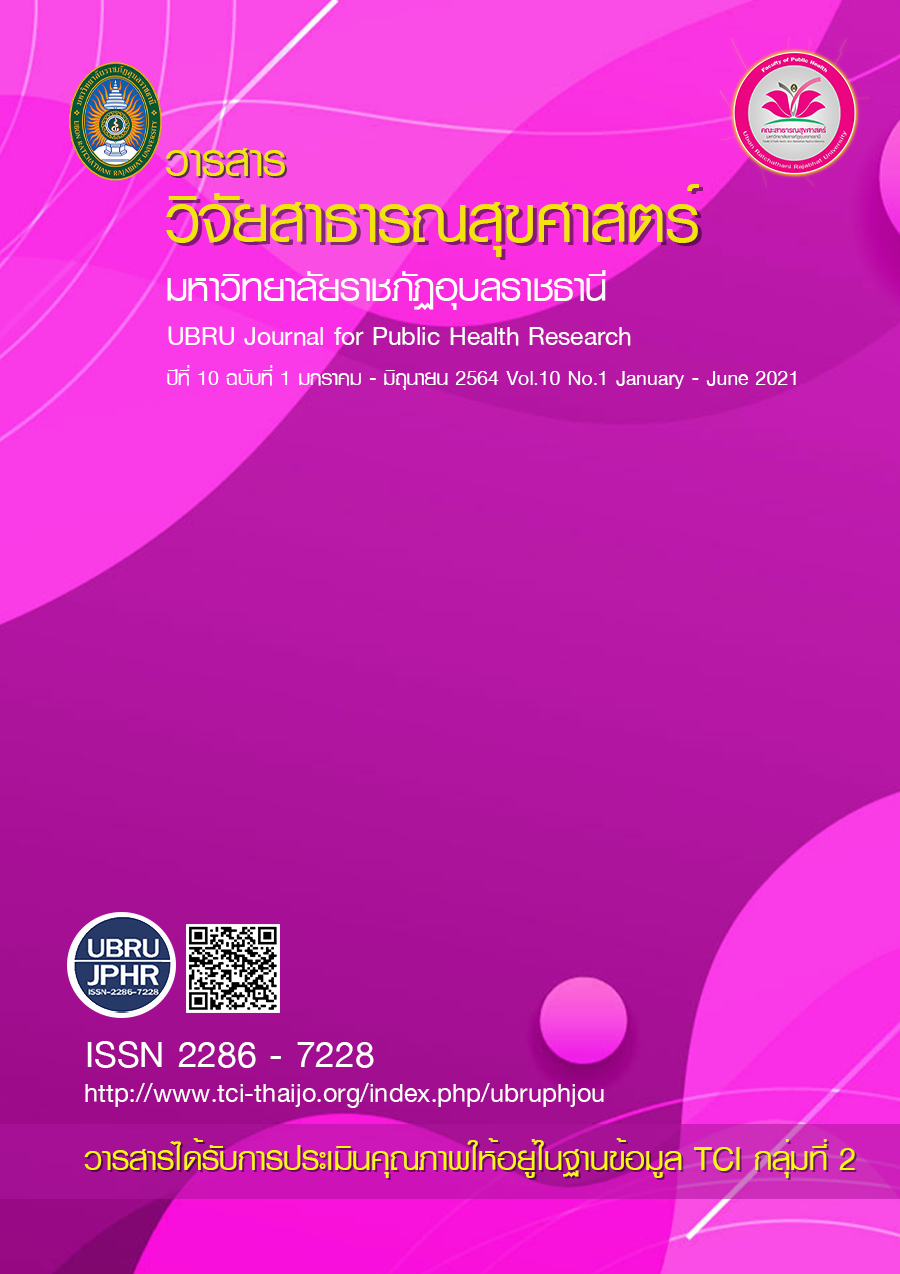Effects of ACLS simulation-based learning program to knowledge and skill for nurses in Kosumphisai Hospital, Mahasarakham province
Keywords:
advance cardiac life support, knowledge and skill, simulation-based learningAbstract
This quasi-experimental research aimed to study the effects of ACLS simulation-based learning program to knowledge and skill for nurses in Kosumphisai hospital, Maha Srakham province. The program consists of 4 hours comprising1-hr. lecturing about CPR guideline 2015,1-hr. lecturing about ECG and 2- hrs. training ACLS simulation-based learning for 70 persons by using simple random sampling. A test for nurses’ ACLS knowledge and an evaluation form for nurses’ ACLS skills were used for collecting data. Descriptive analysis and Paired t-test statistics were used for data analysis.
The study found that averaged age of participants is 34.23 years old (S.D. = 9.26), averaged working experience is 11.41 years (S.D. = 9.25), and most of participants worked in emergency room. The level of Nurses’ ACLS knowledge and skills after training and 3-months later were significantly improve (P-value <0.001), 3-months later, the level of Nurses’ ACLS knowledge was not significantly reduced (P-value =0.6), but the level of Nurses’ ACLS skills was significantly reduced (P-value =0.004).
This study suggests the level of ACLS knowledge and skills after training and 3-months later were significantly improve, ACLS skills was not retained at post training tested until the 3-month check, albeit knowledge had persisted, Nurses’ ACLS skills should be practiced every three months
References
ธารีทิพย์ นันทรักษ์ชัยกุล, สุธัญญา นวลประสิทธิ์, อรพิณ ฐิติตานนท์. (2549). การติดตามผลพยาบาลวิชาชีพผู้เข้าฝึกอบรมโครงการการช่วยฟื้นคืนชีพขั้นสูงโรงพยาบาลสุราษฎร์ธานี. วารสารวิชาการแพทย์เขต 11. 20(1), 1-8
สุภามาศ ผาติประจักษ์. (2558). ความสัมพันธ์ระหว่างความรู้ การรับรู้สมรรถนะของตนเองในการปฏิบัติการช่วยฟื้นชีวิตขั้นพื้นฐานและความสามารถในการกดหน้าอกในนักศึกษาพยาบาลระดับปริญญาตรี. วารสารพยาบาลสงขลานครินทร์. 35 (1): 119 – 140.
อุรา แสงเงิน, สุพัตรา อุปนิสากร, ทิพมาส ชิณวงศ์. (2555). ปัจจัยที่มีความสัมพันธ์กับความรู้และทักษะในการช่วยฟื้นคืนชีพของพยาบาล โรงพยาบาลสงขลานครินทร์. วารสารพยาบาลสงขลานครินทร์. 32(1): 1-10
American Heart Association. (2015). 2015 AHA Guidelines update for CPR and ECC. Dallas: American Heart Association
Bandura A. (1978). Self Efficacy: toward a unifying theory of behavioral change. Psychological review. 84(2), 191-215.
Bandura, A. (1989). Social Cognitive Theory. Greenwich: JAI Press.
Boonmak P, Boonmak S. (2556). Medical Simulation the Way to Improve Patient Care. Srinagarind Medicine Journal. 25(suppl), 80-5.
Boyde M, Wotton K. (2001). A review of nurses’ performance of cardiopulmonary resuscitation at cardiac arrests. Journal for Nurses in Staff Development. 17(5). 248–55.
Broomfield R. (1996). A quasi - experimental research to investigate the retention of basic cardiopulmonary resuscitation skills and knowledge by qualified nurse following a course in professional development. Journal of Advanced Nursing. 23, 1016-23.
Cant RP, Cooper SJ. (2010). Simulation-based learning in nurse education: systematic review. Journal of Advanced Nursing. 66(1). 3-15
Devlin M. (1998). An evaluative study or the basic life support skill of nurse in an independent hospital. Journal of Clinical Nursing. 8(2), 201-5.
Go AS, Mozaffarian D, Roger VL, Benjamin EJ, Berry JD, Borden WB, et al. (2013). Heart disease and stroke statistics - 2013 update a report from the American Heart Association. Circulation. 127(1): e6-e245.
Downloads
Published
How to Cite
Issue
Section
License
เนื้อหาและข้อมูลในบทความที่ลงตีพิมพ์ในวารสารวารสารวิจัยสาธารณสุขศาสตร์ มหาวิทยาลัยราชภัฏอุบลราชธานี ถือเป็นข้อคิดเห็นและความรับผิดชอบของผู้เขียนบทความโดยตรงซึ่งกองบรรณาธิการวารสาร ไม่จำเป็นต้องเห็นด้วย หรือร่วมรับผิดชอบใดๆ
บทความ ข้อมูล เนื้อหา รูปภาพ ฯลฯ ที่ได้รับการตีพิมพ์ในวารสารนี้ ถือเป็นลิขสิทธิ์ของวารสารฯ หากบุคคลหรือหน่วยงานใดต้องการนำทั้งหมดหรือส่วนหนึ่งส่วนใดไปเผยแพร่ต่อหรือเพื่อกระทำการใดๆ จะต้องได้รับอนุญาตเป็นลายลักอักษรณ์จากบรรณาธิการวารสารนี้ก่อนเท่านั้น


